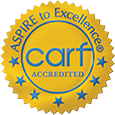Pax House has certified and licensed psychiatrists, psychologists, marriage and family therapists, and addiction counselors on staff. Each client is paired with one of our staff members for a weekly individual counseling session. During the initial session, the client and counselor will discuss the history of abuse, including identifying some of the underlying issues that triggered it, and develop an individualized treatment program. During the client’s time at Pax House, they meet with a specifically assigned counselor on a weekly basis. During these sessions, they will discuss the week, talk about any issues that may have come up during group sessions or other activities, and process specific assignments. The client will typically receive some type of assignment or practice to work on for the upcoming week. Although the bulk of treatment is spent in other activities, including process groups, education groups, therapeutic activities, and 12-step meetings, it is during the individual counseling sessions that the clients can concentrate on their individual issues and see the culminating effects of their treatment program. If at any time the treatment plan seems to be ineffectual, the client and counselor will work together to make the necessary adjustments.
There are several methods of psychotherapy that have been shown to be beneficial for treating addiction. One of the most commonly used forms of therapy is Cognitive Behavioral Therapy (CBT). The basis of CBT is to recognize dysfunctional emotions, maladaptive behaviors, and problematic cognitive processes and learn healthier alternatives to these through learning goal-oriented and specific procedures. Dialectical behavioral therapy has also been shown to be beneficial for treating substance abuse by helping people see their negative and harmful behavioral patterns and replace them with healthier versions. It is a modified version of CBT that focuses more on validation, and is more often used for those with tendencies toward self-harm. At Pax House, we mostly use cognitive behavioral therapy during individual counseling sessions, but our therapists may also use traditional talk therapy, dialectical behavioral therapy, non-judgmental listening, motivational interviewing, and psychodynamic therapy. Our staff members will use a compilation of therapy methods, employing those best suited to each individual client and his or her needs. If a client has a co-occurring mental health disorder, such as depression, anxiety, post traumatic stress disorder (PTSD), or bipolar disorder, it will be addressed alongside their addiction during individual counseling sessions. The aim of counseling at Pax House is to provide a supportive environment for our clients to look inside and address the issues that led them to drinking or using drugs in the first place. They will also learn their individual triggers for abuse and healthy coping mechanisms for managing those triggers. Other treatment activities will help to reinforce the information learned during these counseling sessions, and individual counseling provides a space to process and reflect on what has been learned during other treatment activities.

